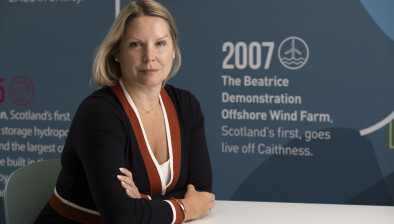Scottish Renewables ‘bitterly disappointed’ over Contracts for Difference announcement

The UK government is to launch a consultation on whether to treat onshore wind projects on remote islands differently from onshore wind projects on mainland Great Britain, sparking anger from Scottish Renewables and the Scottish Government.
Business and energy secretary Greg Clark said today that the government is also looking to end uncertainty over whether onshore wind projects on remote islands should be treated differently from onshore wind projects on mainland Great Britain.
The consultation is asking for views which either support or oppose this position which will be reviewed to provide a comprehensive answer.
Industry body Scottish Renewables has said developers and communities on the Scottish remote islands “will be bitterly disappointed” at this decision, which delays Island developers from competing for long-term renewable energy contracts.
Niall Stuart, chief executive of Scottish Renewables, said: “After years of work on this issue, and many ministerial pledges to resolve it, we still seem no further forward to unlocking investment on Scotland’s islands – home to some of the best wind, wave and tidal resources in Europe.
“With more than 800MW of renewable capacity consented and ready to deliver and a significant capital spend going to UK-based suppliers, the island projects not only serve as important contributions to the Scottish and UK renewable energy targets but to our economy as well.
“But they can only go ahead with contracts to underpin investment and to help meet the prohibitive costs associated with connecting the islands to the national grid.”
In addition, no budget has been ring-fenced for marine energy projects in the wave and tidal sectors.
“The wave and tidal sectors are still at an incredibly early stage in their development, and simply not ready to compete with offshore wind on cost alone,” Mr Stuart added.
“If we want to continue the development of the UK’s world-leading wave and tidal sectors then we now need government to look at how it will support the development and roll out of the technology to get it to the stage where it can compete in the future.”
Mr Stewart said the government’s decision not to launch an auction for onshore wind and solar “makes no sense” as their own research reveals these sectors to be “the cheapest forms of electricity generation in the UK by the middle of the next decade”.
“Both could make a significant contribution to meeting our future climate change targets, keeping bills down for consumers and to driving industrial activity here in the UK. But instead, they are being left in limbo, amongst the only forms of electricity generation in the UK unable to access any contractual framework to support long-term investment,” he said.
Scottish minister for business, innovation and energy, Paul Wheelhouse, said he was “extremely disappointed” and “angered” by the UK government’s handling of the issue.
He said: “The Scottish Government repeatedly sought assurances from UK government ministers about their plans to support renewable energy projects through the Contracts for Difference auction.
“The UK government has misled Scottish Ministers and the members of the Scottish Island Renewable Delivery Forum on the promised support for island wind projects.
“The island projects have already waited for too long for the decision promised by Andrea Leadsom in September 2015.
“The Department for Business, Energy and Industrial Strategy were invited to notify the state aid case for Remote Island Wind ten months ago — why have they not used this time to consult?
“The Scottish Government and the island councils asked the UK government for a meeting of the Scottish Island Renewable Delivery Forum on numerous occasions in the last year but received no response.
“At no time was it suggested there would be a further consultation. We now call upon the Secretary of State to reconvene the Forum and have the courtesy to explain this decision to those affected in person.
“The Scottish Government has also made BEIS aware of the tight timeline for the actions needed to allow island wind projects and the transmission links to be built.
“It is simply unacceptable that they now jeopardise these highly significant projects by proposing a further indefinite delay.
“This delay means the CfD and the needs case submission to Ofgem are again kicked into the long grass and developers are effectively barred from competing in the next CfD round.
“The marine sector has progressed more in 2016 than in any previous year and Scottish firms are in a dominant position.
“Edinburgh firm Nova Innovation has deployed the first two turbines of its Shetland Tidal Array; Atlantis Resources has installed the first four foundations of the world’s largest planned tidal stream array in the Meygen project in the Pentland Firth; and Orkney-based Scotrenewables has begun testing the world’s largest tidal turbine device at our flagship European Marine Energy Centre.
“In this triumphant moment for the sector, it is extremely disappointing that BEIS has reneged on its earlier commitment to provide a minimum allocation for wave and tidal stream technologies. We look forward to detailed discussions with the UK Government to agreeing a way forward for this exciting industry.
“We are determined to do all we can to ensure the tidal energy sector, with its potential to generate sustainable jobs, is taken forward in Scotland.
“We again call for a new approach to the UK’s relationship with Scotland on energy issues, with key decisions on energy policy made following a process of consultation and agreement with the Scottish Government, as set out in the Scotland Act 2016.”















